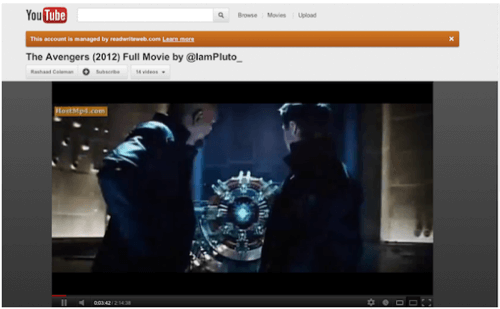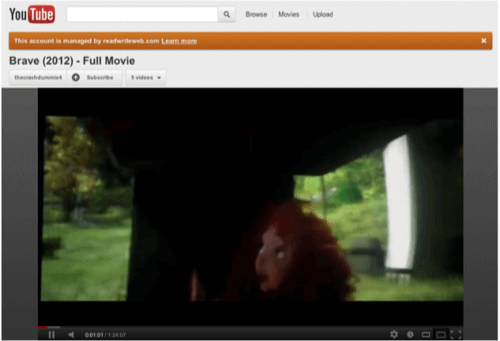
Like a Hollywood sequel, pirated movie hits are back on YouTube – and this time they’re more prevalent than ever.
A year ago, users uploaded a number of pirated movies to Google’s YouTube video service and were eventually taken down. And now movies are back – to the point where if you don’t want to pay for the summer’s biggest blockbusters, you don’t have to:
The Avengers is on YouTube, as is the latest Pixar movie, Brave.
Yes, they’re so-called “cammed” films, which means that they were recorded illegally at a theater with a camcorder, and then uploaded. The quality is poor, with resolutions nowhere near a legitimate copy of the film. But they’re free, and with YouTube’s reach, totally ubiquitous – until they’re taken down. Which could be any minute, of course.
In the last month or so, movie piracy has taken hold of YouTube like wildfire. While the number of current releases is small, finding older films isn’t that hard.
Just Search for “Full Movie”
The keywords? Just two: “full movie”.
All a user needs to do then is check the running length of the film – if it’s 90 minutes or so, chances are that it’s the whole movie. An easier way is to simply filter out the shorter reviews and trailers by appending “, long” to the search or by ticking the appropriate option within the “Filter” drop-down menu.
Even Voltage Pictures, which has sued thousands of anonymous downloaders for copyright infringement, has been victimized: The Hurt Locker has been uploaded in two parts, although in German. Voltage representatives declined to comment.

Piracy Wars
The upsurge in piracy comes just as Google executives have defended the company’s anti-piracy efforts. At the AllThingsD conference at the end of May, Google executive Susan Wojcicki was asked to defend the company from charges made by superagent Ari Emanuel the night before, who had claimed Google does not do enough to combat piracy.
“So I think he was misinformed. Very misinformed,” Wojcicki said of Emanuel. “First of all, we have done as much as we possibly can. We do not want to be building a business based on piracy. We want to work with the content owners, we want to be able to make sure that business is built on content owners who want to have that content distributed across search and YouTube.”
The influx of pirated movies comes as Apple has reportedly pulled the YouTube app from iOS 6, although Google is also apparently writing a standalone YouTube app for Apple’s app store.
But it isn’t like this piracy hasn’t cropped up on YouTube before: plenty of pirated movies – including recent blockbusters – were found there by this author almost a year ago as well.
Dozens of “Hits”
In all, a quick search by ReadWriteWeb found dozens of movies that have been uploaded to the service, from blockbusters like Pirates of the Caribbean 4: On Stranger Tides, Pixar classics including Cars, Cars 2 and Finding Nemo.
The latter three were uploaded from an account known as “FullMovieUpload1”. In some cases, such as the Pixar movies, the pirated movie was found near or next to a link to a paid, authenticated version of the film that Google offered through a partner. Many foreign films have also been uploaded, although copyright issues in other countries are subject to their own laws and restrictions.
As in earlier years, full movies can either be found by searching through the main search box, or else via the list of recommended movies that accompany them. Helpfully, some movies like the explicit Ken Park have been age-restricted by the community.
How Did We Get Here?
YouTube enforces a 10-minute limit on uploaded videos, but users qucikly found they could simply break up longer clips into ten-minute chunks, with helpful pointers to the next clip in the series.
In 2010, YouTube eliminated that the 10-minute limit for some trusted users, some of whom quickly used their new-found freedom to upload copyrighted clips.
Traditionally, YouTube has had a “three strikes and you’re out” policy with regards to copyright; in 2011, the company forced offenders to attend “copyright school” to learn what they could and could not upload.
Today, Google uses an automated system called “Content ID” to identify possibly copyrighted films and TV shows and take them down before they’re actually live on the site. At the AllThingsD conference, Google executive Sundar Pichai described the process this way:
“It is automatic in many ways,” Pichai said. “There’s no human intervention. It’s a piece of software that runs and tries to identify it… it’s an extremely challenging problem, technical computer science problem.
“It’s a quality issue, just like image recognition or voice recognition,” Pichai added. “The technology behind the Content ID system is fairly impressive, and it keeps getting better. And I think whats important is that it’s a tough area to scan through a video, and know for sure that it’s copyrighted, and who owns the copyright. And I think it’s something that we have invested a lot in, I think it’s over 50,000 hours of engineering we have invested in… $30 million on this project alone.”
A Google spokesman also noted that YouTube users upload 72 hours of video every minute, making the process of identifying copyrighted content even more challenging. ReadWriteWeb provided the URL of the uploaded The Avengers movie to Google at 11:25 am Pacific Time, Tuesday, which Google presumably will remove.
Wojcicki also addressed what Google representatives have previously claimed: first, that it’s unclear who owns the copyright to a given movie, and second, that Content ID requires the copyright holder to notify Google before a movie can be pulled down. Finally, some copyright holders choose to leave content on YouTube in order to monetize or sell ads against it.
“At the end of the day, we need to hear from the content owner,” Wojcicki claimed.
Clear Breakdowns
The problem, of course, is that it’s hard to believe that the uploaded versions of The Avengers or Blaze were done legitimately to “monetize” the movie. And while it’s possible that the poor quality of the movies fooled Content ID, a general search for “full movie” could be a clue that Google needs to inspect the files more closely.
Interestingly, Google’s Content ID system has had some successes. Movies that were uploaded last year – Fast Five, Scream 4,, Black Hawk Down, and others – don’t seem to have made a reappearance.
Meanwhile, things may be about to change. In April, a German court ruled that Google must detect future violations of copyrighted content after a rights holder alerts the company the first time.
Will YouTube be able to meet that standard?
You can check for yourself: Just type “full movie” into the YouTube search bar every so often.

















